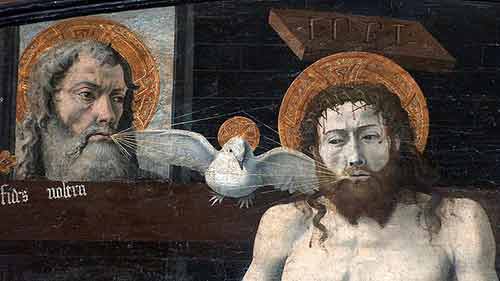
Yes – sometimes people actually disagree. But, often people “talk past each other” – they believe the same thing(s) but express them differently… Or, they may sound like they are answering the same question – appear to be doing so – but they are actually answering different questions. And that is especially the case when people are using different languages. People who only speak one language often think that translation is a simple enterprise – this word in this language means that word in that language. It is nothing like that simple.
The many comments to my recent post on the Filioque (And the Son Again) highlighted the “talking past each other”. And so I promised another post on the Filioque. This is it – or at least a part of it.
A reminder for newbies here: in the agreed Nicene-Constantinopolitan Creed (First Council of Nicaea in 325; First Council of Constantinople 381), the original says: “…we believe in the Holy Spirit… who proceeds from the Father, …”
Καὶ εἰς τὸ Πνεῦμα τὸ Ἅγιον, … τὸ ἐκ τοῦ Πατρὸς ἐκπορευόμενον, …
In the West, people have added “and the Son” to this original, making it “…we believe in the Holy Spirit… who proceeds from the Father and the Son, …”
Et in Spíritum Sanctum, … Qui ex Patre Filióque procédit.
I see a lot of western Christians talking about the external life of God – the Father and the Son sending the Spirit. Whereas I see eastern Christians talking about the inner life of God. Eastern Rite Catholics (in communion with Pope Francis, the Bishop of Rome) follow the Eastern Orthodox approach and omit “and the Son” when they recite the Creed in their liturgies.
As is so often the case, with the ambiguity possible from the Bible, a verse like John 15:26 may be pressed into usage on either side of the discussion:
When the Advocate comes, whom I will send to you from the Father, the Spirit of truth who comes from the Father, he will testify on my behalf
Let’s dig a little deeper.
From St Basil the Great (330-379) onwards, the Greek Fathers see the ultimate origin of the Holy Spirit in the Father (ἐκπορεύομαι; ekporeúomai). Unpacking the meaning of this word we get: ἐκ – “out of” and πορεύομαι “to come or go”. From this, we get: to originate from a cause or principle. So this stresses the original source.
The theology of the early Latin Fathers, however, focused on how the Divine Essence was communicated from the Father to the Son, and through Him to the Spirit. They (drawing on Tertullian, 160-220) called this communication “processio“. Let’s look at processio: pro – “before” or “in front of” and cedo – “to go”. Do you notice how the Latin has less stress on the original source?
In the East, they were responding to “Where does the Spirit come from?” – The Father.
In the West, they were asking: “Whom is the Holy Spirit in front of (i.e, from Whom does the Spirit proceed)?” – the Father and the Son.
Hence, we can say, when the Eastern Fathers consider the Holy Spirit, they ask “Where does He come from originally or ultimately (ἐκπορευόμενον)?” The answer is “the Father.”
The Western Fathers, however, ask: “Whom is the Holy Spirit in front of? From Whom does he proceed?” The answer is “both Father and Son.”
To underscore a point I am making – “and the Son” was not added to the Greek original; it was added to the Latin translation. The question, then, would be: what happens to the orthodoxy of the Creed in Greek (the original) if we add “καὶ τοῦ Υἱοῦ” (“and the Son” in Greek) into it? That is one of the things we will be looking at in the next post in what is now becoming a series.
To be continued…
If you appreciated this post, do remember to like the liturgy facebook page, use the RSS feed, and sign up for a not-very-often email, …




I’m with you on this so far, and unpacking John 15.26 is interesting. If I send you a book, I am the source of the book, but it proceeds from me and the postal services. Likewise, it is only through Christ that we can receive the Spirit, who comes from the Father. However, i think you place too much weight on the parsing of the two verbs. The Latin verb is a translation of the Greek one, and a fairly faithful one at that (well, as faithful as translation can be). Both languages make much use of prepositions as verbal prefixes modifying meaning, yet these don’t always change meaning as we might expect. In this case, the use of a different prepositional prefix in the Latin is not a mistranslation, but a change that allows the result to be semantically similar to the original. Equating morphological change in translation to semantic change is a weakness of this argument.
Well spotted, Gareth.
Although I am etymology-obsessed, etymology cannot be equated to meaning. [Actually – it is because I am etymology-obsessed that I am aware of this!] So, we agree so far. But – returning to a point in my post – yes, the Latin may be a ‘fairly faithful’ translation of the Greek BUT, and I really don’t want to start writing the next post in a comment here, I don’t think “this word in this language means that word in that language”.
What does not follow, your assertions not withstanding, and this is a spoiler for my next post, is that procedit and ἐκπορευόμενον are SO equivalent (as some reading your comment would conclude) that one can simply add καὶ τοῦ Υἱοῦ to the Creed in the manner that Filioque is.
In most languages, you might safely translate Filioque and insert it into the Creed. Would you do that in Greek?! I challenge you to find a Greek-speaking rite that, following your argument of “as faithful as translation can be”, has καὶ τοῦ Υἱοῦ in its Greek-language rite. Even the Pope would not do that!
Blessings.